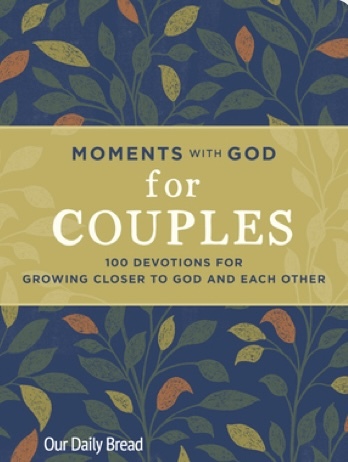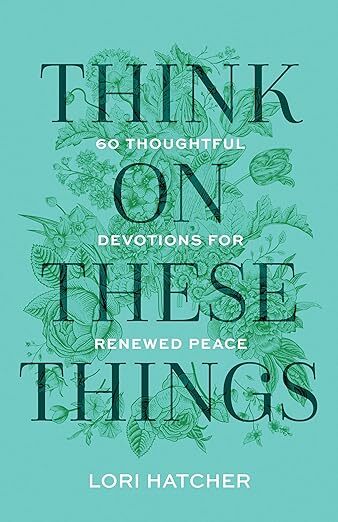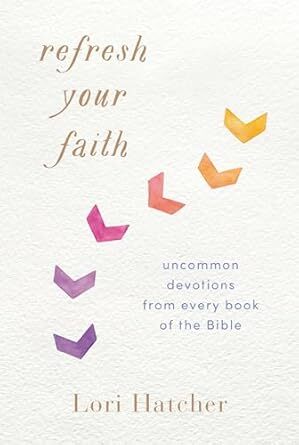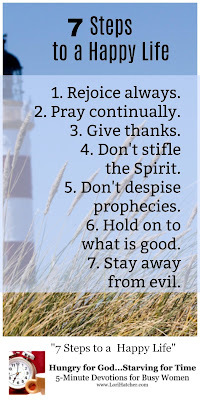Lori Hatcher's Blog: Refresh Blog
November 28, 2025
Would You Like to Give Life-Changing, Soul-strengthening Gift this Year?
Lori here:
I’m rethinking Christmas gifts this year. Maybe you are too. I’m getting older and more intentional. I want to make every moment, every dollar, and every gift-giving opportunity count.
This is why I’m giving gifts that can impact those I love in spiritual ways. Eternal ways. God-directed ways.
This year, I’m giving devotionals to friends, neighbors, co-workers, and beloved family members.
I love Christian devotionals because they’re a source of bite-sized daily encouragement to make people think and point them to Jesus. They’re easy to pick up and put down, take only a few minutes a day to read, and are very affordable. Most are less than $15.
Here are a few of my favorite devotionals (and a few from my work with Our Daily Bread), along with affiliate links, in case you’d like to share a few devotionals as gifts this Christmas season.
Do You Know Couples Who Need to Draw Closer to God and Each Other?

Whether you’ve been married for a month or 50 years, reclaim the joy in your relationship that sometimes gets lost amid personality differences, moments of pride, and life circumstances. This volume will help you and your spouse make space to reflect Christ in your marriage every day through relatable stories, relevant Bible verses, and practical applications. With topics like, “It’s Not About You,” “Better than Sex,” and “What to Do When You Don’t Know What to Do,” this He Said/She Said devotional is relatable, down-to-earth, and husband-friendly.
Night Light: A Devotional for Couples

Whether you’re just married or are celebrating your golden anniversary, you need regular, quiet moments with your husband or wife―times to renew love and intimacy with each other and with the Lord. Night Light, by Dr. James Dobson and his wife, Shirley, will help you do just that. This 6-month, daily devotional offers the personal, practical, and biblical insights that have sustained the Dobsons’ marriage for forty years and encouraged Christian couples and families around the world.
Do You Know Someone Who Needs Peace?

Everyone goes through difficult seasons, tough losses, and moments that feel unbearable. In today’s world, people thirst more than ever for reassurance and guidance. Streams in the Desert provides a river of wisdom, encouragement, and inspiration to weary travelers.

Each day, reset your mind by meditating on what’s true, right, pure, and praiseworthy, and lean on God in the midst of the messy and mundane. Discover how to have joy, hope, strength, and deep-rooted peace when you focus on Jesus no matter what’s happening around you.
Do You Know Children Who Need to Know God?

Our Daily Bread for Kids: 365 Devotions from Genesis to Revelation
Our Daily Bread for Kids: 365 Devotions from Genesis to Revelation provides boys and girls ages 6 to 10 with everything they need for a year of daily devotions:
Engaging stories from Genesis to Revelation
Bible text from easy-to-understand versions
Reading suggestions for exploring more
Prayer starters
Daily truths to remember
And fun facts ranging through history and spanning the globe
Children will grow in their knowledge of Scripture as they learn of God’s desire for us to know Him, understand how He made a way through Jesus, and discover how the Holy Spirit guides us in our everyday lives.
Do You Know Someone Who’s Reading Through the Bible?

Allow God’s Word to change your life, one word at a time! This 66-day devotional highlights one relevant, sometimes unexpected, word from each book of the Bible. Lori Hatcher, the best-selling author of Refresh Your Faith and Refresh Your Prayers, shares simple—but never simplistic—truths. She continues to remind us that every part of Scripture is active, alive, and applicable. From beginning in Genesis to new in Revelation, ponder each significant word as you move through your day and allow God to transform your heart and mind.

Refresh Your Faith contains 66 culturally relevant, story-driven devotions, one from each book of the Bible. Each real-life story spotlights an unusual verse or Bible passage that you may have overlooked in your usual Bible reading. Lori Hatcher challenges you with additional features like an uncommon thought to ponder; an unusual faith action step; and an unfamiliar passage suggestion for additional Bible reading.
Do You Know Someone with a Strong Faith Who’s Facing a Tough Situation?

What do you believe about God? Do you believe that He can restore? Or that He answers prayers? Do you believe that He delights in you?
As you spend 60 days in these devotions, Lori Hatcher will reassure you of who God is and who He says you are. In each meditation, you’ll find:
A biblical truth you can claim to rebuild your faith in the toughest circumstances
Comforting assurances from Scripture that God is with you and for you, no matter what
Encouragement of God’s delight and joy in you always
A prayer and biblical affirmation to remind you of God’s steadfast presence and unwavering promises
Heartwarming, story-centered readings from popular devotional writer Lori Hatcher
Spend just a few minutes each day with these devotions, and let your heart find strength in the reassurance of God’s unending love for you.
I hope you decide to give at least one Christian devotional to someone on your Christmas list this year. It just might change their life—and their eternity!
Now it’s your turn—leave a comment below and share your favorite devotional.
Have you subscribed to Refresh?

If you’d like to receive Lori’s weekly 5-minute devotions to help you rediscover your passion for God and His Word subscribe HERE .
The post Would You Like to Give Life-Changing, Soul-strengthening Gift this Year? appeared first on Lori Hatcher.








 Related Stories7 Steps to a Happy Life7 Steps to a Happy Life - EnclosureFive Powerful Reasons to Serve the “Least of These”
Related Stories7 Steps to a Happy Life7 Steps to a Happy Life - EnclosureFive Powerful Reasons to Serve the “Least of These”
November 17, 2025
Three Biblical Secrets to Live a Long and Happy Life

Greetings, Refresh Readers: While science links longevity to healthy habits like diet and exercise, Scripture reveals even deeper truths. These timeless principles not only protect us from harmful choices but also bring peace, prosperity, and eternal hope. True longevity begins with obedience to God and ends with everlasting life through faith in Christ. Today we’ll dive into three biblical secrets to live a long and happy life.
If you’d like to listen along, click the audio player below. If the player says ERROR, click HERE to listen to “3 Biblical Secrets to Live a Long and Happy Life.”
Three Biblical Secrets to Help Us Live a Long and Happy Life
A recent study, detailed in Health magazine, “found that four bad behaviors—smoking, drinking too much alcohol, not exercising, and not eating enough fruits and veggies—can hustle you into an early grave, and, in effect, age you by as many as 12 years.”
These results don’t surprise me. The medical community has known this for a long time. What does surprise me is that after an extensive Internet search, none of the top articles I read addressing the topic of longevity reported what I learned recently during my Bible reading time.
3 Secrets:
1. Keep God’s Commands
Proverbs 3:1-2 says: “My son, do not forget my teaching, but keep my commands in your heart, for they will prolong your life many years and bring you prosperity.” Wow, not just prolong my life, but prolong my life MANY years. AND bring me prosperity.
How does this work? Let’s think it through. If I’m honoring God’s commands, I’m not going to make many of the lifestyle choices that lead to premature death. I suspect thieves and murderers have a considerably shorter life expectancy than law-abiding citizens. Those destined for the electric chair certainly do.
Honoring God’s commands also means that we’re less likely to engage in reckless or foolish behavior, irresponsible eating and drinking, and life-destroying relationships. A woman who has chosen to honor God with her body won’t be sleeping around and catching an STD, nor will she be driving drunk.
If she’s applying God’s commandments to her life, she’s also going to be developing solid, strong friendships, a life enhancing quality, according to Prevention magazine. She’s going to be working hard caring for her family and her home, another life-extending behavior. And she’s going to have less stress, because it’s impossible to simultaneously worry and trust God.
From a financial standpoint (remember the second half of the promise in Psalm 3:1-2, prosperity), applying God’s commands mean we’re less likely to engage in financially reckless behavior. We’ll save instead of spending carelessly. We’ll give to the church and other worthy causes. We’ll avoid indebtedness, repay what we owe in a timely manner, and pay our taxes. Financial advisers like Dave Ramsey agree that following these practices will help bring about prosperity.
What do you know? God’s Word is spot on. “Walk in all the way that the LORD your God has commanded you, so that you may live and prosper and prolong your days in the land that you will possess” (Deut. 5:33).
2. Honor Our Parents
Deuteronomy 5:16 commands us to “Honor your father and your mother, as the LORD your God has commanded you, so that you may live long and that it may go well with you.” Ephesians 6 calls it “the first command with a promise.” A promise from God. To bless us.
Honoring our parents means listening carefully to and considering their wisdom. It means treating them with respect, serving them unselfishly, and making time for them. When we honor our parents, we take into account their human frailties, personality quirks, and sin and love them anyway. Honoring them becomes an extension of worship to our Lord, our heavenly Father, and this pleases God. So much, that He promises to bless us and extend our lives.
The final secret to help us live a long and happy life isn’t limited to our physical lives. If we put this next step into practice, we’ll not only have a reasonably good chance of living to a ripe, old age, we’ll live forever.
3. Believe in Jesus Christ
Our lives on this earth are fleeting. Following God’s commands and honoring our parents will help extend and enhance them, but one day they will end. Our souls, however, will live on. What we’ve done with Jesus Christ will determine whether our souls will spend eternity in God’s presence or eternally separated from him.
Thankfully, God has made provision for this as well. John 3:16 records his plan: “For God so loved the world that he gave his only begotten Son, that whoever believes in him shall not perish, but have everlasting life.”
Medical science has discovered much about longevity and life-extending practices. The truths found in God’s Word form the basis of this knowledge. Obeying God’s Word and honoring our parents will increase our chances of living a long life, but there are no guarantees. Godly believers who honor their parents still die, and some of them die young. This is why what matters most is what happens after our physical bodies die. Entrusting our souls to Jesus Christ is our only hope.
But it is a strong and sure hope.
Now it’s your turn. What life-extending practices have you embraced, and with which ones are you still struggling? Leave a comment below and share your thoughts.
Looking for CHRISTMAS GIFT IDEAS to Impact Your Loved Ones for Christ?
If you’re like me, you’re already thinking about how you can bless your loved ones this Christmas. Maybe you know someone who’s going through a rough patch—perhaps they’ve been sick, or they’re struggling in their marriage or family, or they’ve growing discouraged in their faith and struggling to hang on. Allow me to suggest two books that could show your love to them AND strengthen their faith:

Think on These Things: 60 Thoughtful Devotions for Renewed Peace
Bursting with hope-filled, true-life stories about everything true, noble, just, pure, and lovely, this devotional will inspire your friends and loved ones to reject discouragement and think on the truths that help them cling to Jesus and trust that He’s at work in their lives.

Lord, I Believe: 60 Devotions for Your Troubled Heart
For the one who hasn’t trusted God yet and the one who wants to trust Him more, this 60-day devotional resounds with powerful reasons to believe that God loves us, God is at work in our lives, and God is trustworthy. Its story-drive content is perfect for the not-yet-believer, the new believer, and the mature believer, all who need to be reminded why placing our faith in Christ is reasonable and wise.
Have you subscribed to Refresh?

If you’d like to receive Lori’s weekly 5-minute devotions to help you rediscover your passion for God and His Word subscribe HERE .
The post Three Biblical Secrets to Live a Long and Happy Life appeared first on Lori Hatcher.

Click the icon below to listen.








 Related StoriesThree Biblical Secrets to Live a Long and Happy Life - Enclosure7 Steps to a Happy Life7 Steps to a Happy Life - Enclosure
Related StoriesThree Biblical Secrets to Live a Long and Happy Life - Enclosure7 Steps to a Happy Life7 Steps to a Happy Life - Enclosure
November 9, 2025
The Truth About Christian Positivity: Hope That Faces Reality
Greetings, Refresh Readers,
Many people think Christians are naïve optimists—modern-day Pollyannas wearing rose-colored glasses and ignoring life’s hardships. But biblical joy isn’t denial; it’s defiance. The apostle Paul, writing from prison, modeled a gratitude that acknowledged suffering yet trusted God’s goodness in the midst of it. His example shows that choosing joy isn’t pretending everything is fine—it’s believing God is still at work even when life feels anything but. We’ll explore this topic in today’s post.
If you’d prefer to listen to today’s post, click the audio player below. If you see an ERROR message, CLICK HERE to Read “The Truth about Christian Positivity: Hope that Faces Reality.”
The Truth about Christian Positivity: Hope that Faces Reality
Sometimes people call me a Pollyanna.
The name comes from the 1913 novel Pollyanna by Eleanor H. Porter describing a girl who plays the “glad game”—trying to find something to be glad about in every situation.

Generally viewed negatively, Pollyanna people are those who are not only positive, but are so positive they deny reality. They might tell someone with terminal cancer that everything’s going to be OK without acknowledging the very real danger of their disease.
Our society often perceives Christians as Pollyannas. Those who believe this think our hope in the sweet by and by negates the realities of the nasty now and now. They think we slap on our rose-colored glasses and skip through fields of daisies, blissfully ignoring the hand grenades exploding around us.
This couldn’t be further from the truth. If anything, Christians are more aware of evil and suffering. We recognize that sin has dragged its poisonous tentacles across everything beautiful and pure with one objective—to destroy it. Christians are also more aware of what God has done and is doing to conquer the power of sin and put an end to its reign of death and destruction.
Some call me Pollyanna because I’m committed to practicing gratitude instead of grumbling. I’m in good company then, because the apostle Paul shared a similar commitment. (Maybe his colleagues called him PAULyanna.)
Listen to his words of encouragement:
“Rejoice in the Lord always. I will say it again: Rejoice!” (Philippians 4:4).
He wrote these lines from prison. Chained between two guards. Surely the only way he could write such happy words in light of his circumstances was to have lost his grip on reality, right?
There’s one problem, though—the text doesn’t support this. Instead of sunshine and roses, Paul’s words to the Philippians are awash with the gory details of his life:
He had no hope of rescue and expected to die for his faith.
“. . . I am being poured out like a drink offering.”
He was shackled between two guards 24 hours a day.
“. . . I am in chains for Christ” (Philippians 1:13).
He lacked food, clothing, and essentials.
“. . . not one church shared with me in the matter of giving and receiving, except you only” (4:15).
Yet He Chose Gratitude Instead of Grumbling. Listen to His Words:
About His Impending Martyrdom:
“But even if I am being poured out like a drink offering on the sacrifice and service coming from your faith, I am glad and rejoice with all of you” (2:17).
About His Imprisonment:
“Now I want you to know, brothers, that what has happened to me has really served to advance the gospel. As a result, it has become clear throughout the whole palace guard and to everyone else that I am in chains for Christ. Because of my chains, most of the brothers in the Lord have been encouraged to speak the word of God more courageously and fearlessly” (1:12-14).
About His Deprivation:
“I have learned to be content whatever the circumstances. . .” (4:11).
Paul didn’t maintain this optimistic outlook because he denied the reality of his circumstances, but because he believed God was at work, for good, in his circumstances. With this theology firmly in place, he channeled his thoughts toward gratitude, not grumbling.
“Whatever is true, whatever is noble, whatever is right, whatever is pure, whatever is lovely, whatever is admirable—if anything is excellent or praiseworthy—think about such things, he wrote in his letter to the Philippians (4:8).
This discipline, combined with prayer, helps us triumph over life’s most difficult circumstances. It enables us to echo Paul’s words from his prison cell:
“I can do all things through Him who gives me strength” (4:13).
What are the difficult circumstances of your life right now? How might things change if you apply the principles of Philippians 4:8? Why not try it and see? A dear friend once told me, “I don’t think practicing gratitude would have changed my circumstances, but it sure could have changed how I handled them.”
Can you think of a time when you chose to “think on these things”? How did it affect your outlook and your circumstances?
If you need a guide to help you think on the good and lovely things mentioned in Philippians 4:8, I’ve love for you to grab a copy of my book, Think on These Things, 60 Devotions for Renewed Peace.
Lori’s Devotional, an Amazon #1 New Release!

Have you ordered your copy of Lori’s newest devotional, Think on These Things: 60 Thoughtful Devotions for Renewed Peace? An Amazon #1 Hot New Release, this story-driven devotional will help you fight negativity and think on those things that are true, noble, right, pure, lovely, excellent, and praiseworthy. You’ll experience joy and peace every day.
Have you subscribed to Refresh?

If you’d like to receive Lori’s weekly 5-minute devotions to help you rediscover your passion for God and His Word, subscribe here or at the top of the paIf you’d like to receive Lori’s weekly 5-minute devotions to help you rediscover your passion for God and His Word subscribe HERE or at the top of the page.
The post The Truth About Christian Positivity: Hope That Faces Reality appeared first on Lori Hatcher.

Click the icon below to listen.






 Related StoriesThe Truth About Christian Positivity: Hope That Faces Reality - EnclosureFive Powerful Reasons to Serve the “Least of These”Five Powerful Reasons to Serve the “Least of These” - Enclosure
Related StoriesThe Truth About Christian Positivity: Hope That Faces Reality - EnclosureFive Powerful Reasons to Serve the “Least of These”Five Powerful Reasons to Serve the “Least of These” - Enclosure
November 3, 2025
Five Powerful Reasons to Serve the “Least of These”
Lori here: Would you like to discover five biblical reasons to love and serve “the least of these”? In today’s post, we’ll learn how selfless compassion deepens our faith and reflects the heart of Jesus.
And if you’d like to listen instead of read, click the audio player below :). If you see the word ERROR, CLICK HERE to listen to “5 Powerful Reasons to Serve the Least of These.”

Sometimes it’s easy to serve the “least of these.” Other times, not so much. It’s easy to love little children until they whine, tantrum, or disobey. And the poor until they act ungrateful or entitled. Many of us are willing to care for the sick—until someone throws up on us. And we welcome the lonely until they get clingy and demanding.
Nevertheless, God calls us to serve those who appear to bring nothing to the table. Matthew 25:40 tells us, “whatever you did for one of the least of these brothers of mine has done it unto me.”
In light of this command, we should ask ourselves, “Who is “the least of these” that God is calling me to love and serve?
Maybe it’s a family member, co-worker, neighbor, or church member. Or it could be a young mom, college student, or struggling teen. Or a lonely friend, grieving widow, or elderly acquaintance.
“Least of these” can be one-time opportunities to do a kind deed, meet a need, or speak an encouraging word, or they can be longer-term commitments to get involved in someone’s life. Regardless, we should always be ministering to at least one of the least of these.
The litmus test is that our commitment is a sacrificial relationship that appears to be lopsided—we’re giving and they’re receiving.
Five Powerful Reasons to Love and Serve “the least of these.”
1. God blesses us when we share generously.
“Give, and it will be given to you. Good measure, pressed down, shaken together, running over, will be put into your lap. For with the measure you use it will be measured back to you” (Luke 6:38). Whether it’s time, talent, or treasure, God always manages to bless us more than we bless others.
2. God will get the glory for our kind deeds.
“In the same way, let your light shine before others, so that they may see your good works and give glory to your Father who is in heaven” (Mat. 5:16).
3. When we were young believers, others helped us grow.
Now we can pay it forward. “We who are strong have an obligation to bear with the failings of the weak, and not to please ourselves” (Rom. 15:1).
4. Jesus promises eternal rewards for those who selflessly serve others.
“Then the King will say to those on his right, ‘Come, you who are blessed by my Father; take your inheritance, the kingdom prepared for you since the creation of the world. For I was hungry and you gave me something to eat, I was thirsty and you gave me something to drink, I was a stranger and you invited me in,” (Mat. 25:34-35).
5. It makes God happy.
“Do not neglect to do good and to share what you have, for such sacrifices are pleasing to God” (Heb. 13:16). Who doesn’t want to make God happy?
Self-focused or Other-focused?

I’ve been a believer for more than 30 years. Sometimes I’ve been self-focused, and other times I’ve been other-focused. It hasn’t taken me long to discover that self-focus is self-limiting. Ministering to others, however, especially when it’s challenging and sacrificial, grows our faith, expands our hearts, and draws others closer to God.
Some of the needy people I’ve befriended purely out of obedience to God’s promptings have become my dearest friends. While the relationships may have started out lopsided, as they grew in spiritual maturity, they have loved me loyally and unselfishly.
Some of the sick people I’ve ministered to have taught me priceless lessons about contentment, courage, and faith. More than once I’ve visited someone intending to encourage them and realized instead that they had encouraged me.
Some of the spiritually immature people I’ve discipled have challenged me think through what I believe and be able to defend it. They’ve inspired me with their fledgling faith and reminded me of my responsibility to set a good example.
I, too, am the least of these.
I always learn something about myself and the Lord when I minister to the least of these. Probably the greatest lesson I’ve learned is that, in God’s eyes, I, too, am the least of these. He loves me when I’m unlovely, comforts me when I am sick, and visits me when I am in a prison of my own making. In every way, he loves me the way he calls me to love others.
So I ask you again, who is “the least of these” whom God is calling you to love and serve? If you don’t have someone, pray and ask God to show you who around you most needs your love and care.
Have you ordered Lori’s latest book?

Have you subscribed to Refresh?

If you’d like to receive Lori’s weekly 5-minute devotions to help you rediscover your passion for God and His Word subscribe HERE.
The post Five Powerful Reasons to Serve the “Least of These” appeared first on Lori Hatcher.

Click the icon below to listen.









CommentsThe Truth About Christian Positivity: Hope That Faces Reality by LoriAHatcherFive Powerful Reasons to Serve the “Least of These” by LoriAHatcherAre You Feeling Overloaded? Try These Three Helpful Tips by LoriAHatcher7 Steps to a Happy Life by LoriAHatcherA Sweet Peek into God’s Tender Heart for You by LoriAHatcherPlus 5 more...Related StoriesFive Powerful Reasons to Serve the “Least of These” - Enclosure7 Steps to a Happy Life7 Steps to a Happy Life - Enclosure
October 27, 2025
Are You Feeling Overloaded? Try These Three Helpful Tips
Hello, Refresh Readers, Are your days overloaded? Discover how packing a suitcase can teach you to manage your time and priorities. Learn to let go of “good” things that crowd out God’s best and live each day with purpose, peace, and balance through biblical wisdom and prayer.
Would you like to listen to an audio version of this post? Click the Play button below. For email readers, if the player says, “ERROR,” CLICK HERE TO listen to “Are You Feeling Overloaded? Try These Three Helpful Tips.”
Suitcase Overload
Have you ever put your suitcase on the scale at the airport and discovered it was overweight?
I remember the time I helped my daughter and her husband pack for an overseas move. The airline allowed two checked bags each weighing less than 50 pounds. Even half a pound over the limit would cost them dearly.
As they prepared to fill their suitcases, they made three piles—Yes, No, and Maybe. In the Yes pile they put necessities—clothing, personal care items, and important paperwork. In the No pile they put the non-essentials—books they weren’t really interested in reading, older clothes they didn’t wear any more, and a game they had never played. In the Maybe pile they put items they liked, but weren’t vital to day-to-day living—a souvenir coffee mug, decorative tableware, and some food items.

They packed the important items in the suitcases first and filled most of the space, then they filled in the remaining space with items from the Maybe pile. The No pile went straight to the trashcan.
My Days
My days are very similar to my kids’ suitcases. And I’ve realized I can use the same principles they applied to their suitcases to help me decide how to spend them.
First, I can only cram so much into a day before I get into trouble. Overfilling my calendar is always counter-productive. It guarantees I’ll eventually crash and burn. Exhaustion, frustration, and inefficiency are common side effects of overloaded days.
Second, I must choose wisely what I put into a day. Some activities, like reading my Bible, caring for my family, working, and attending church, are vital. I can include other activities, like talking with a friend, surfing the Internet, or reading a book after I’ve completed my most important responsibilities. Other pursuits are simply time wasters I’d be better off tossing aside.
Third, sometimes, despite my best efforts, my days become overweight. When my kids were packing their suitcases, they knew it would be wise to check the weight before we got to the airport. I pulled out the bathroom scale, and, as we suspected, the biggest suitcase was seriously overweight.
Making Choices
“I guess we’re going to have to leave some stuff behind,” my son-in-law said. He removed a few of the Maybe items, but it was still too heavy.
“Why don’t we try to redistribute the weight?” I suggested. We pulled a few books out of the suitcase and exchanged them for clothing and shoes from a less full suitcase. When we weighed the heaviest suitcase again, we were delighted to find it was a few pounds lighter. The true test, however, would come at the airport.
Remove and Redistribute

Some of my days resemble my son-in-law’s suitcase. In order to be able to manage them, I must remove some things altogether and redistribute others. The litmus test I use to determine what has to go comes from Oswald Chambers: “The great enemy of the life of faith in God is not sin, but the good which is not good enough. The good is always the enemy of the best.” It’s easy to fill my days with good things, but when the good things begin to crowd out the best things, I know it’s time to reevaluate and reorder my priorities.
When I pray, God shows me what to remove and what to consider delegating to someone else. This frees me up to spend my time on what’s best in my life right now—the tasks God has called me and only me to do.
Back to the Luggage
Now back to the luggage. When our turn came at the baggage counter, my son-in-law hoisted the biggest suitcase on the scale, and we held our collective breath. For a few seconds the red numbers jumped around—51.2, then 49.8, then 50.9. Finally it blinked three times and was still—50.0!
Whew! Not an ounce to spare. Our happy smiles and high fives made the ticket agent grin as she slapped a sticker around the handle and waved us on.
What about you?
What about you? Are your days overloaded? Or perhaps you’ve filled them with good things that are squeezing out the best God has for you. Prayerfully ask the Lord to help you evaluate how you’re filling your days. Commit to make the necessary changes, and live each day seeking God’s best.
Have you ordered Lori’s latest book?

Have you subscribed to Refresh?

If you’d like to receive Lori’s weekly 5-minute devotions to help you rediscover your passion for God and His Word subscribe HERE .
The post Are You Feeling Overloaded? Try These Three Helpful Tips appeared first on Lori Hatcher.

Click the icon below to listen.









CommentsThe Truth About Christian Positivity: Hope That Faces Reality by LoriAHatcherFive Powerful Reasons to Serve the “Least of These” by LoriAHatcherAre You Feeling Overloaded? Try These Three Helpful Tips by LoriAHatcher7 Steps to a Happy Life by LoriAHatcherA Sweet Peek into God’s Tender Heart for You by LoriAHatcherPlus 5 more...Related StoriesAre You Feeling Overloaded? Try These Three Helpful Tips - EnclosureFive Powerful Reasons to Serve the “Least of These”Five Powerful Reasons to Serve the “Least of These” - Enclosure
October 20, 2025
7 Steps to a Happy Life
~ Lori here. Happy Monday! Would you like to discover God’s 7-step plan for true happiness? In a world full of empty advice about how to be happy, the Bible offers a timeless, practical guide. Learn how these seven simple steps can help you live with lasting joy, peace, and purpose—no matter your circumstances.
Would you like to listen to this podcast? I’ve added an audio component. You’ll see the media player below, but if it says Error, CLICK HERE to listen to “7 Steps to a Happy Life.”
Everyone wants a happy life. Few know how to have one.
A recent Google search for How to Live a Happy Life turned up a list that included these suggestions:
Fake it ‘til you feel it, and buy some happiness. Wow. Add Jump off a bridge and end it all and the list will be complete.
Thankfully, when I dug a little deeper, I discovered the writer was using some clever literary techniques to make her point, and her article wasn’t as depressing as the initial list has led me to believe.
My search also discovered Tom Casano’s article, 15 Simple Ways to Live a Happy Life, in the Huffington Post. In contrast to my first impression of the first list, his suggestions were very uplifting, probably because many of them were biblically based. Help others, be thankful, and share are a few of his suggestions.
The best list, however, is harder to find in a search engine. If you type 1 Thessalonians 5:16-22 into your browser, however, it will pop up.
Would you like to read God’s 7-step prescription for how to live a happy life? Here it is:
1. Rejoice always!
Writers are taught to use exclamation points sparingly, reserving them for only the most enthusiastic exclamations. Any editor in town, however, would agree that this two-word sentence that includes the root word JOY should most certainly end in an exclamation point.
Rejoicing always includes celebrating the simple things, greeting everyone with a smile, and letting nothing good go unnoticed.
2. Pray constantly.
The only way to navigate this troubled world with joy is to maintain constant communication with its Creator. Like a phone call we never hang up on, communication should flow between us and our Savior all day long. This is possible because of our relationship with Jesus, “because he always lives to intercede for (us)” (Hebrews 7:25). When we bring every need, fear, and hope to God through prayer, we walk with a lighter step, because we’ve transferred the load onto Jesus’ broad shoulders.
3. Give thanks in everything.
The ability to give thanks in everything begins with the firm confidence that God is working all things out for our good and His glory. When we encounter a situation that seems to be less than God’s ideal, we wait and watch in simple trust.
As Jennifer Kennedy Dean, author of Live a Praying Life, says,
“When you are in a situation that has an outcome that seems not to be according to God’s will, wait to see what happens next. The story is not over. That circumstance will set the stage for the next event, which will lay the foundation for the next step, which will open the door for the next piece of the plan, and on and on. Finally, you will look back from a place in your life that is ‘immeasureably more than all (you) ask or imagine’ (Eph. 3:20), and you will say, ‘I could not be here if I’d never been there.’”
Giving thanks in everything is an expression of trust, even when we don’t see God’s hand at work in our lives.
4. Don’t stifle the Spirit.
Romans 8:11 tells us that when we place our faith in Christ, the Holy Spirit comes to live within us. As our constant companion, He convicts us of sin and of righteousness (John 16:8). Through His still, small voice, He points us toward the good and warns us away from the bad.
Sadly, it’s possible to quench, grieve, or stifle the Spirit’s voice. Repeatedly ignoring or arguing with His promptings makes it harder to hear Him. Filling our minds with worldly philosophies while neglecting God’s word makes it more difficult to discern truth. Finally, disobeying the Holy Spirit when He nudges you to do a kind act or say a kind word stifles His ability to work through you for good in the world.

5. Don’t despise prophecies, (but test all things).
The Bible definition of prophecy (and its verb, to prophesy) is two fold: it means to foretell as in to reveal a future event, and it means to forthtell, as in to provide biblical instruction. This verse specifically encourages us not to despise the forthtelling of God’s word.
In other words, don’t take preaching and teaching lightly. Don’t think you’re above instruction. Don’t assume every message is meant for someone else. Don’t criticize the pastor so you won’t be held accountable for his message. Assume every message you hear or read is sent from God to you for the purpose of making you more like Jesus.
But there’s one caveat: hold every message (secular and religious) you hear and read – on television, radio, music, theatre, literature and the news up to the standard of God’s Word. If it agrees with the Bible, embrace it. If it contradicts it, discard it.
6. Hold on to what is good.
Some translations say cling to or hold fast. Simply put, this command tells us not to let go of what’s good in our lives. Dig in and fight for it. Open your news browser on any given day and you’ll see evidence of how the enemy is trying to steal, kill, and destroy.
Your marriage? Hold fast. Purity of thought and action? Cling tightly. Godly friends? Hold on. A church that preaches the Bible without compromise? Dig in. Strap on the belt of truth. Lift up the shield of faith. Clothe yourselves with humility. Hold on and don’t let go.
7. Avoid every kind of evil.
This one is a no-brainer. To have a happy life, we must avoid the deeds of the flesh as listed in Galatians 5:19-21: immorality, impurity, sensuality, idolatry, sorcery, enmities, strife, jealousy, outbursts of anger, disputes, dissensions, factions, envying, drunkenness, and carousing.
Our world is filled to the brim with things that are good, pure, true, honest, just, lovely, and virtuous. We must cultivate an appetite for these things and spurn the others.
Seven simple steps to a happy life. Why not try them today?
Rejoice always!
Pray constantly.
Give thanks in everything,
Don’t stifle the Spirit.
Don’t despise prophecies, but test all things.
Hold on to what is good.
Avoid every kind of evil
(1 Thessalonians 5:16-22).
Now it’s your turn. Which of these has most helped you live a happy life? Leave a comment below and bless us all.
Have you ordered Lori’s latest book?

Have you subscribed to Refresh?

If you’d like to receive Lori’s weekly 5-minute devotions to help you rediscover your passion for God and His Word subscribe HERE .
The post 7 Steps to a Happy Life appeared first on Lori Hatcher.

Click the icon below to listen.









CommentsThe Truth About Christian Positivity: Hope That Faces Reality by LoriAHatcherFive Powerful Reasons to Serve the “Least of These” by LoriAHatcherAre You Feeling Overloaded? Try These Three Helpful Tips by LoriAHatcher7 Steps to a Happy Life by LoriAHatcherA Sweet Peek into God’s Tender Heart for You by LoriAHatcherPlus 5 more...Related Stories7 Steps to a Happy Life - EnclosureAsk This Simple Question to Unlock the Treasure of the Bible – with Bonus AudioFive Powerful Reasons to Serve the “Least of These”
October 13, 2025
A Sweet Peek into God’s Tender Heart for You
~Hi Refresh Readers! What if we approached God with the same trust and delight as a child? In today’s devotion, you’ll discover how seeing God as an abundant provider—not a reluctant giver—can transform your faith and deepen your relationship with Him.
If you’d like to listen to the audio version of this blog post, click the play button on the audio player below. For those of you reading by email, if you see an ERROR message, CLICK HERE to listen to “A Sweet Peak into God’s Tender Heart for You.”
I’ve never seen a child eat with so much enthusiasm.
Like a squirrel to an oak tree, Caroline had moved from across the kitchen to my side. A tug on my leg induced me to pick her up and plop her onto the counter beside me while I carved up the fat, green watermelon.
“Mmmm. Mmmm,” she purred, eagerly watching as I raised the knife and split the striped orb in half. Before I could cut the first slice, she had reached an eager hand into its wet, pink center. I handed her a bite-sized morsel. Cramming it into her mouth and chomping down, she squirted a pink river down her chin and onto the front of her t-shirt. “Mmmmm,” she said again, reaching for another piece.

We sat there for a while, me cutting the watermelon into tiny pieces and she happily eating them. Finally, her tummy full, she wiggled to the edge of the counter so I could set her back onto the floor. Off she ran, sticky, satisfied, and happy.
Jennifer Kennedy Dean, in Live a Praying Life, describes a similar situation. “A child simply assumes that the need or desire is potent enough to speak for itself. All that is required is to bring that need to Mom’s or Dad’s (or Gigi’s) attention. The request assumes the answer. The child’s only thought is to bring the need to the source of supply.”
Her observation made me realize that I often treat God as a reluctant giver instead of an abundant provider. Caroline helped me better understand God’s heart toward me.
When I realized Caroline was hungry, I eagerly met her need. My supply was abundant, and I fed her with a liberal, generous hand. I didn’t resent her request, nor did I find it burdensome. In contrast, it made me happy that she came to me. She trusted me to satisfy her desire. I loved feeding her.
God the Father feels the same way about us. He invites us, nay, expects us to bring our needs to him. His supply is ample, and his heart benevolent. He smiles when we push back from his table satisfied and happy.
It’s no surprise, then, that Jesus told his disciples, “. . . unless you change and become like little children, you will never enter the kingdom of heaven” (Mat. 18:3).
Dean writes, “You don’t need to build a theological case for why God should want to meet your need. He wants to meet your need because He’s your daddy, and you are the apple of His eye.”
Father, forgive us for treating you more like a deadbeat dad than a generous father. Help us trust you with the eager, sure confidence of a little child. When we forget, remind us that you are a father who loves to give good gifts to his children. Grow our faith. Show us your ways. Lead us ever deeper into the ocean of your love. In the strong name of Jesus we pray, Amen.
Have you ordered Lori’s latest book?

Have you subscribed to Refresh?

If you’d like to receive Lori’s weekly 5-minute devotions to help you rediscover your passion for God and His Word subscribe HERE.
The post A Sweet Peek into God’s Tender Heart for You appeared first on Lori Hatcher.

Click the icon below to listen.









CommentsA Sweet Peek into God’s Tender Heart for You by LoriAHatcherWas Job’s Wife a Loser? How to Respond to Tragedy with Faith by LoriAHatcherLet’s Try This Again—Audio Version 2.0 of “Ask this Simple Question to Unlock the Treasure of the Bible! by LoriAHatcherAsk This Simple Question to Unlock the Treasure of the Bible – with Bonus Audio by LoriAHatcherHow to Recognize Genuine Repentance: 9 Signs from Scripture by LoriAHatcherPlus 5 more...Related StoriesA Sweet Peek into God’s Tender Heart for You - EnclosureDoes Your Prayer List Overwhelm You? Three Powerful Truths to HelpWas Job’s Wife a Loser? How to Respond to Tragedy with Faith
Was Job’s Wife a Loser? How to Respond to Tragedy with Faith
Lori here ~ Job’s wife is often remembered for her harsh words, but was she really faithless—or just grieving? Discover the deeper story of her sorrow, God’s mercy, and the lessons her struggle offers us today.
Audio Version:
Would you prefer to listen to Was Job’s Wife a Loser? rather than read this week’s Refresh post? Click on the audio player below. (If the audio player says ERROR, CLICK HERE instead and scroll to the audio player online.)
Let me know what you think about this new way to enjoy Refresh.
Was Job’s Wife a Loser? How to Respond to Tragedy with Faith

I always thought Job’s wife was a loser.
A loser with a capital L.
To be honest, for many years, I tried not to ponder Job and his wife’s story too deeply. I was afraid if I got too close I might catch the plague that ravished their lives. So I kept my distance, skimming the book that bears Job’s name instead of stepping inside.
But one day …
But one day, as I breezed past the land of Uz in my Bible reading, Job’s wife opened the door and invited me in.
I considered slapping on a mask and gloves and running the other way, but instead I took a deep breath and accepted her invitation.
Heartbreak was everywhere. A series of tragedies had robbed Job of almost everything he held dear. His ten children had died in a catastrophic accident. Bands of raiders had ravaged his flocks, stealing thousands of animals. Pus-filled, oozing boils covered his body, disfiguring his skin and making him wish he’d never been born.
Imagine what it would be like to be married to Job.
Scripture records the two lines that immortalized Job’s wife: “Do you still hold fast to your integrity? Curse God and die!” (Job 2:9).
Wow. What a woman.
Instead of reminding Job of the goodness of God in the face of tragedy, she encourages him to jump off a cliff. “How can you believe in a God who has turned his back on you?” I can imagine her saying. “Spit in his face and return to the ground from whence you came.”
Some of the women in the Bible inspire me with their bold and courageous faith, but not Mrs. Job. Her faithless, bitter words make me squirm.
Ready to judge her and move on, I glance her way. And for the first time, I see—really see—the woman behind these gut-wrenching lines.
Somehow, she looks different up close. It’s interesting how our perspective changes when we look into a person’s eyes instead of down our noses at them.

I realized three things:
Gazing into her grief-ravaged face, I realized three things:
Job’s ten dead children were her dead children, too.
The valuable animals that rode off into the sunset behind the bandits? Her defense against hunger and poverty also.
And that deathly-ill man oozing with infection? Her beloved husband.
No wonder her words sound bitter and faithless. They erupt from the depths of her grieving soul. Like the suffering Psalmist, she voices the question every believer asks during times of tragedy, but few dare to say aloud, “Did I purify my heart and wash my hands in innocence for nothing?” (Psalm 73:13). God, have I wasted my life serving you?
Words for the Wind
Pastor/Teacher John Piper calls words like these “words for the wind.”
“There are words with roots in deep error and deep evil,” he writes in the online article, “When Words Are Wind.” “But not all grey words get their color from a black heart. Some are colored mainly by the pain, the despair. What you hear is not the deepest thing within. There is something real within where they come from. But it is temporary—like a passing infection—real, painful, but not the true person.”
Asaph, the Psalmist agrees. He explained the hurt that spawned his faithless words. “When I became embittered and my innermost being was wounded, I was a fool and didn’t understand; I was an unthinking animal toward You” (Psalm 73:22).
Yet Asaph returned to the faith that held him when he was too weak to hold himself. I believe Job’s wife did, too. “Yet I am always with You;” Asaph declared to the God he had doubted. “You hold my right hand. You guide me with Your counsel, and afterwards You will take me up in glory. Whom do I have in heaven but you? And I desire nothing on earth but You. My flesh and my heart may fail, but God is the strength of my heart, my portion forever” (Psalm 73:23-26).
Looking deeply into Job’s wife’s eyes, I lowered the gavel I’d been prepared to strike in judgment and draped the mantle of mercy over her grieving shoulders.
This Is What God Did, too.
I believe this is what God did, too.
Unlike Lot’s idolatrous wife, whose backward glance revealed her true heart condition, Job’s wife suffered no judgment from the Lord, only healing and restoration. When God blessed Job again with health, wealth, and family, I believe Mrs. Job was standing right there beside him, a testimony to God’s goodness and mercy.
“So the Lord blessed the latter part of Job’s life more than the earlier. He owned 14,000 sheep, 6,000 camels, 1,000 yoke of oxen, and 1,000 female donkeys. He also had seven sons and three daughters. . . . Job lived 140 years after this and saw his children and their children to the fourth generation. Then Job died, old and full of days” (Job 14:12-13, 17).
What Should We Do When We Encounter Tragedy?
What should we do when we encounter someone staggering under the pain of tragedy?
Piper suggests we pray for discretion and wisdom. “Let us learn to discern whether the words spoken against us or against God or against the truth are merely for the wind — spoken not from the soul, but from the sore. If they are for the wind, let us wait in silence and not reprove. Restoring the soul, not reproving the sore, is the aim of our love.”
I left Job’s house that day with a new opinion of his wife. I realize now that she isn’t a loser. Only a woman who bowed low under the weight of sorrow and grief, struggling to make sense of it all and desperate for hope and compassion.
In my quickness to judge, perhaps I, not Job’s wife, was the loser.
Now it’s your turn. When have you misjudged someone, only to discover later that there was much you didn’t understand? How have you always viewed Job’s wife? Leave a comment below and share your thoughts.
Have you subscribed to Refresh?

The post Was Job’s Wife a Loser? How to Respond to Tragedy with Faith appeared first on Lori Hatcher.

Click the icon below to listen.








 Related StoriesWas Job’s Wife a Loser? How to Respond to Tragedy with Faith - EnclosureDoes Your Prayer List Overwhelm You? Three Powerful Truths to HelpAsk This Simple Question to Unlock the Treasure of the Bible – with Bonus Audio
Related StoriesWas Job’s Wife a Loser? How to Respond to Tragedy with Faith - EnclosureDoes Your Prayer List Overwhelm You? Three Powerful Truths to HelpAsk This Simple Question to Unlock the Treasure of the Bible – with Bonus Audio
October 6, 2025
Let’s Try This Again—Audio Version 2.0 of “Ask this Simple Question to Unlock the Treasure of the Bible!
Thank you, friends, for trying my new experiment — to add an audio version of my blog, “Ask This Simple Question to Unlock the Treasure of the Bible.” Unfortunately, the link in your email didn’t work, but you can still listen because the episode is LIVE on my website.
CLICK HERE to listen to the audio of “Ask this Simple Question!” (And hopefully I’ll have the kinks worked out for next week’s post. Y’all pray for me! Technology’s a bear.
Would you like to discover how asking one simple question—‘So what?’—can transform your Bible study? Learn how the who, what, when, where, why, and how of Scripture lead to life-changing application.
The post Let’s Try This Again—Audio Version 2.0 of “Ask this Simple Question to Unlock the Treasure of the Bible! appeared first on Lori Hatcher.









Ask This Simple Question to Unlock the Treasure of the Bible – with Bonus Audio
Lori here ~ Would you like to discover how asking one simple question—‘So what?’—can transform your Bible study? Learn how the who, what, when, where, why, and how of Scripture lead to life-changing application.
New Resource!
Before we jump into today’s post, I wanted to introduce you to a new way to enjoy my weekly Refresh post—AUDIO!
I love written resources, but I also love audio resources like podcasts and sermon recordings. I don’t always have time to read, but I often have time to listen while I do other tasks (like commuting to work, folding laundry, or exercising).
So, I decided to add an audio version of my blog post. You can listen by clicking the box below. I hope you like it. Please let me know what you think!
“So What?”
If someone asked me this question, I’d probably be offended. It sounds snarky, slightly rude, and in your face. Yet I include this question in my list of questions to answer when I read my Bible.

When I prayed about how to approach each book of the Bible, my training as a newspaper reporter kicked in. Ask the five W’s and an H—Who, What, When, Where, Why, and How. Of course, brilliant!
Ask These Questions:
Who wrote the book and to whom is it written?
What was the main theme?
When did the events take place?
Where did the events take place?
Why did the author write the book?
How did the events unfold?
Then Ask One More:
Looking over my list of questions, I knew I was on the right track to teach the historicity of each book, but something was missing. That’s when I added, “So what?” “Now that I’ve studied the facts of the book, so what? Why does this matter? How should this impact my life?”
“So what?” might just be the most important question at all, because if we read the Bible for information only, it probably won’t change our lives. And we should never leave an encounter with God’s Word unchanged.
The Bible is a living book, one that has the power to bolster faith, transform people’s hearts, and make us more like Christ. But studying the who, what, when, where, why, and how of Scripture can be more like reading a biography of Lincoln instead of meeting Lincoln himself. It’s only a shadow of everything it could be.
This is why we must also ask, “So what?”
What “So What?” Looks Like

Here are a few examples of what this looked like in my study of Genesis:
FACT: God deliberately created mankind in his image instead of human life spontaneously occurring.
SO What? My life and the lives of those around me aren’t accidents. They’re part of God’s plan and purpose for the world. Every life matters, because God creates every life.
FACT: God created Adam and Eve with a free will, even though he knew they’d use it to sin against him.
SO What? God doesn’t force people to love him. He gives us the ability to choose.
FACT: God made a promise in Genesis 3:15 that he would send a Redeemer to save mankind from their sin. Thousands of years later, God kept his promise by sending Jesus Christ to die on the cross for the sins of the world.
SO What? I can trust God to keep his promises in my life as well.
FACT: God called Abraham to offer his only son as proof of his love for God. Abraham was able to be willing to obey his command because he believed God was a promise-keeping God.
SO What? Sometimes God calls me to do difficult things. If I truly trust God, I’ll demonstrate my trust by obeying him.
FACT: God used the unjust circumstances of Joseph’s life to bring deliverance to thousands of people.
SO What? God can use the difficult circumstances of my life to bring about good in other people’s lives.
FACT: God placed the infant nation of Israel in the incubator of Egypt so they could grow and begin to establish themselves as a people without interference from dangerous nations. In Egypt, they grew from 70 people to 2.5 million.
SO What? Similarly, God can orchestrate unlikely situations or circumstances in my life for good.
You’ll Be Amazed
Studying the facts of a book gives us vital information to help us understand God’s message. Asking “So what?” helps us apply God’s message to our lives. So the next time you open your Bible to study a passage, I encourage you to learn the who, what, when, where, why, and how of a passage. Then, prayerfully and intentionally, ask God to show you how each passage applies to your life right now. You’ll be amazed at how God’s Word comes alive.
Now it’s your turn. What is your approach to studying the Scripture, and how has it enhanced your understanding? Leave a comment below and share your insights.

Have you subscribed to Refresh?

If you’d like to receive Lori’s weekly 5-minute devotions to help you rediscover your passion for God and His Word subscribe HERE .
The post Ask This Simple Question to Unlock the Treasure of the Bible – with Bonus Audio appeared first on Lori Hatcher.

Click the icon below to listen.








 Related StoriesAsk This Simple Question to Unlock the Treasure of the Bible – with Bonus Audio - EnclosureDoes Your Prayer List Overwhelm You? Three Powerful Truths to Help60 Powerful Answers for a Faith Crisis (and a Cover Reveal!)
Related StoriesAsk This Simple Question to Unlock the Treasure of the Bible – with Bonus Audio - EnclosureDoes Your Prayer List Overwhelm You? Three Powerful Truths to Help60 Powerful Answers for a Faith Crisis (and a Cover Reveal!)
Refresh Blog
- Lori Hatcher's profile
- 101 followers



